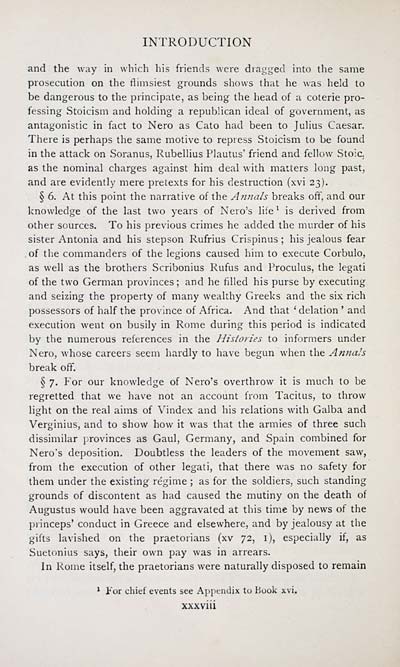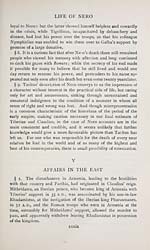Download files
Complete book:
Individual page:
Thumbnail gallery: Grid view | List view

INTRODUCTION
and the way in which his friends were dragged into the same
prosecution on the flimsiest grounds shows that he was held to
be dangerous to the principate, as being the head of a coterie pro-
fessing Stoicism and holding a republican ideal of government, as
antagonistic in fact to Nero as Cato had been to Julius Caesar.
There is perhaps the same motive to repress Stoicism to be found
in the attack on Soranus, Rubellius Plautus' friend and fellow Stoic,
as the nominal charges against him deal with matters long past,
and are evidently mere pretexts for his destruction (xvi 23).
§ 6. At this point the narrative of the Annals breaks off, and our
knowledge of the last two years of Nero's life^ is derived from
other sources. To his previous crimes he added the murder of his
sister Antonia and his stepson Rufrius Crispinus ; his jealous fear
of the commanders of the legions caused him to execute Corbulo,
as well as the brothers Scribonius Rufus and Proculus, the legati
of the two German provinces; and he filled his purse by executing
and seizing the property of many wealthy Greeks and the six rich
possessors of half the province of Africa. And that ' delation ' and
execution went on busily in Rome during this period is indicated
by the numerous references in the Histories to informers under
Nero, whose careers seem hardly to have begun when the Annals
break off.
§ 7. For our knowledge of Nero's overthrow it is much to be
regretted that we have not an account from Tacitus, to throw
light on the real aims of Vindex and his relations with Galba and
Verginius, and to show how it was that the armies of three such
dissimilar provinces as Gaul, Germany, and Spain combined for
Nero"s deposition. Doubtless the leaders of the movement saw,
from the execution of other legati, that there was no safety for
them under the existing regime ; as for the soldiers, such standing
grounds of discontent as had caused the mutiny on the death of
Augustus would have been aggravated at this time by news of the
piinceps' conduct in Greece and elsewhere, and by jealousy at the
gifts lavished on the praetorians (xv 72, i), especially if, as
Suetonius says, their own pay was in arrears.
In Rome itself, the praetorians were naturally disposed to remain
* for chief events see Appendix to Book xvi.
xxxviii
and the way in which his friends were dragged into the same
prosecution on the flimsiest grounds shows that he was held to
be dangerous to the principate, as being the head of a coterie pro-
fessing Stoicism and holding a republican ideal of government, as
antagonistic in fact to Nero as Cato had been to Julius Caesar.
There is perhaps the same motive to repress Stoicism to be found
in the attack on Soranus, Rubellius Plautus' friend and fellow Stoic,
as the nominal charges against him deal with matters long past,
and are evidently mere pretexts for his destruction (xvi 23).
§ 6. At this point the narrative of the Annals breaks off, and our
knowledge of the last two years of Nero's life^ is derived from
other sources. To his previous crimes he added the murder of his
sister Antonia and his stepson Rufrius Crispinus ; his jealous fear
of the commanders of the legions caused him to execute Corbulo,
as well as the brothers Scribonius Rufus and Proculus, the legati
of the two German provinces; and he filled his purse by executing
and seizing the property of many wealthy Greeks and the six rich
possessors of half the province of Africa. And that ' delation ' and
execution went on busily in Rome during this period is indicated
by the numerous references in the Histories to informers under
Nero, whose careers seem hardly to have begun when the Annals
break off.
§ 7. For our knowledge of Nero's overthrow it is much to be
regretted that we have not an account from Tacitus, to throw
light on the real aims of Vindex and his relations with Galba and
Verginius, and to show how it was that the armies of three such
dissimilar provinces as Gaul, Germany, and Spain combined for
Nero"s deposition. Doubtless the leaders of the movement saw,
from the execution of other legati, that there was no safety for
them under the existing regime ; as for the soldiers, such standing
grounds of discontent as had caused the mutiny on the death of
Augustus would have been aggravated at this time by news of the
piinceps' conduct in Greece and elsewhere, and by jealousy at the
gifts lavished on the praetorians (xv 72, i), especially if, as
Suetonius says, their own pay was in arrears.
In Rome itself, the praetorians were naturally disposed to remain
* for chief events see Appendix to Book xvi.
xxxviii
Set display mode to: Large image | Transcription
Images and transcriptions on this page, including medium image downloads, may be used under the Creative Commons Attribution 4.0 International Licence unless otherwise stated. ![]()
| Early Gaelic Book Collections > Matheson Collection > Cornelli Taciti annalium > (42) |
|---|
| Permanent URL | https://digital.nls.uk/76567417 |
|---|
| Description | Items from a collection of 170 volumes relating to Gaelic matters. Mainly philological works in the Celtic and some non-Celtic languages. Some books extensively annotated by Angus Matheson, the first Professor of Celtic at Glasgow University. |
|---|
| Description | Selected items from five 'Special and Named Printed Collections'. Includes books in Gaelic and other Celtic languages, works about the Gaels, their languages, literature, culture and history. |
|---|

